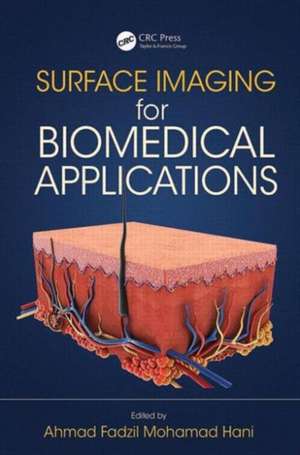Surface Imaging for Biomedical Applications
Editat de Ahmad Fadzil Mohamad Hanien Limba Engleză Hardback – 23 iun 2014
It examines the biological causation of four skin disorders (psoriasis, vitiligo, ulcer, and acne), provides basic terminologies in surface imaging, and details the outcome of various clinical observations and other research. It also details numerous measurement parameters related to surface imaging (body surface, skin color, tissue characteristic, thickness, roughness, volume of skin, and retinal changes).
- Discusses the development of a psoriasis severity measurement tool
- Provides material on assessing segmented repigmentation areas in vitiligo patients via VT-Scan
- Introduces a volume ulcer assessment using non-invasive 3D imaging
- Presents an automated system for acne grading that is based on capturing the images of various body parts using the DSLR camera
- Includes the MATLAB® codes for various pattern recognition techniques applied during the assessment/measurement at the end of each chapter
Preț: 1100.64 lei
Preț vechi: 1481.01 lei
-26% Nou
Puncte Express: 1651
Preț estimativ în valută:
210.64€ • 217.60$ • 175.30£
210.64€ • 217.60$ • 175.30£
Comandă specială
Livrare economică 05-19 martie
Doresc să fiu notificat când acest titlu va fi disponibil:
Se trimite...
Preluare comenzi: 021 569.72.76
Specificații
ISBN-13: 9781482215786
ISBN-10: 1482215780
Pagini: 333
Ilustrații: 184 black & white illustrations, 49 black & white tables
Dimensiuni: 156 x 234 x 23 mm
Greutate: 0.59 kg
Ediția:1
Editura: CRC Press
Colecția CRC Press
ISBN-10: 1482215780
Pagini: 333
Ilustrații: 184 black & white illustrations, 49 black & white tables
Dimensiuni: 156 x 234 x 23 mm
Greutate: 0.59 kg
Ediția:1
Editura: CRC Press
Colecția CRC Press
Public țintă
Academic and Professional Practice & DevelopmentCuprins
Skin Surface Roughness Measurement for Assessing Scaliness of Psoriasis Lesions. Determination of Lesion Color for Clustering Psoriasis Erythema. Body Surface Area Measurement for Lesion Area Assessment. Skin Lesion Thickness Assessment. Analysis of Skin Pigmentation. Quantitative Assessment of Ulcer Wound Volume. Grading of Acne Vulgaris Lesions.
Notă biografică
Ahmad Fadzil Mohamad Hani heads the Centre for Intelligent Signal & Imaging Research (CISIR), a university centre of excellence under the Mission-Oriented in Biomedical Engineering at Universiti Teknologi PETRONAS, Perak, Malaysia. He graduated with a BSc (1st Class Honors) in electronic engineering in 1983, obtained his MSc in telematics in 1984, and his PhD in image processing in 1991 from the University of Essex, UK. He is a Fellow of the Academy of Sciences Malaysia and a Fellow of the Institution of Engineers Malaysia. His current research challenges are developing new analysis techniques for early osteoarthritis and drug addiction using MRI techniques and bio-optics for skin pigmentation analysis. Professor Fadzil has authored over 190 research articles in journals and conferences proceedings, granted several patents, and won several awards for his work.
Descriere
A range of medical imaging devices can be used to diagnose skin abnormalities and related diseases as well as for interventional and non-invasive procedures. This book focuses on the various aspects of medical imaging devices and techniques including processing and pattern recognition. The book is structured in a reader-friendly fashion, with chapters designed according to the various measurement parameters related to surface imaging such as skin coloring, thickness, roughness, and body surface.
